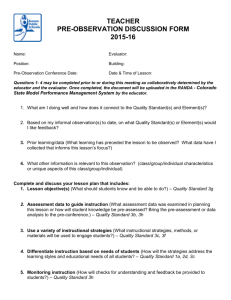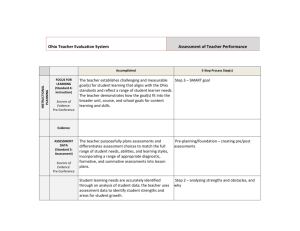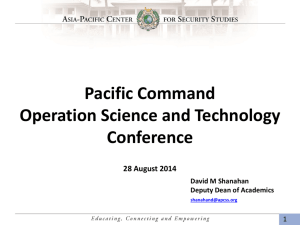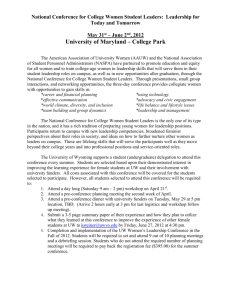how to start an online program slides
advertisement
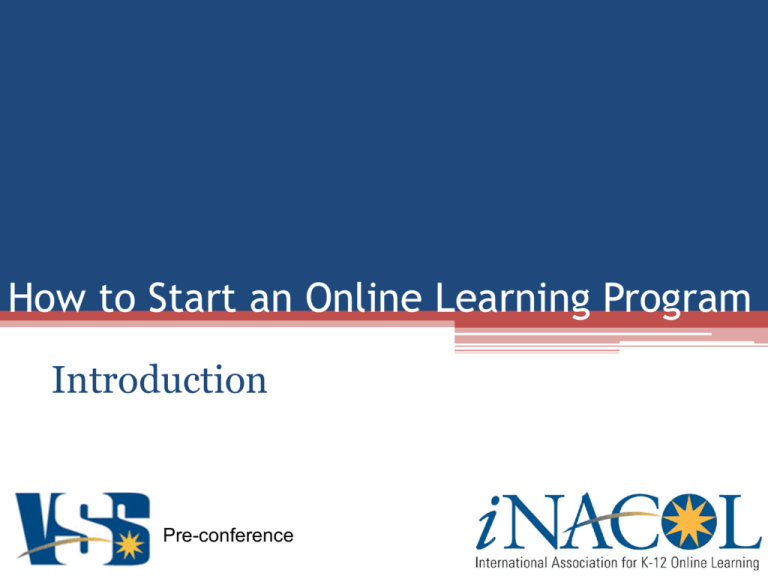
How to Start an Online Learning Program Introduction Pre-conference Welcome and Introductions • Each panelist will provide a brief introduction • Each participant ▫ ▫ ▫ ▫ Name School or Organization and role Status of your online program What was something interesting that happened to you on your way to this conference Pre-conference Overview of Session • This session is organized around a document, Starting an Online School: First and Second Level Issues which was part of a presentation at the 2002 Virtual High School Symposium by Steven Kalmon and John Watson • There will be four expert panels to discuss the various issues identified in the topic. • The intent is for this to be a very interactive session with plenty of opportunities for you to ask questions. Pre-conference Who Wants to Start an Online Program? Rank the following states from earliest to latest of first offering online courses through their state led program: A. Illinois C. Georgia Pre-conference B. Idaho D. Maine Who Wants to Start an Online Program? $100 Question iNACOL Stands for: A. Innovative Name for Available College Online Labs B. International Association for K-12 Online Learning C. I Named A Creative Oval Language D. Igloos Need All Cold Open Lounges Pre-conference Who Wants to Start an Online Program? $200 Question LMS Stands for: A. Language Mediated System B. Level Managed Situations C. Learning D. Igloos Need All Management System Cold Open Lounges Pre-conference Who Wants to Start an Online Program? $300 Question Which one is NOT a delivery model: A. Asynchronous C. Fully Online Pre-conference B. Blended D. C-Section Who Wants to Start an Online Program? $500 Question LO stands for: A. Learning Object C. Lights Out Pre-conference B. Likely Outcome D. Lively Oregano Who Wants to Start an Online Program? $1,000 Question State virtual schools are most common in what region of the country: A. West B. Midwest C. Southeast D. Northeast Pre-conference Who Wants to Start an Online Program? $2,000 Question SME stands for: A. Scientific Method Evaluation C. Subject Matter Expert Pre-conference B. Statistical Mean Equalizer D. Southern Methodist Educator Who Wants to Start an Online Program? $4,000 Question ID stands for: A. Instructional Designer B. IDentification C. Inventory Database Pre-conference D. Intelligent Data Who Wants to Start an Online Program? $8,000 Question OER stands for: A. Official Evaluation Reference B. Optical Elliptical Reflection C. Open Evaluation Report D. Open Educational Resources Pre-conference Who Wants to Start an Online Program? $16,000 Question A course enrollment is generally considered: A. One student enrolled B. One student enrolled in an online course in one semester course C. One student enrolled D. It all depends on one year long course your online program Pre-conference Who Wants to Start an Online Program? $32,000 Question According to Keeping Pace, which of the following items is NOT identified as an important element in determining a course completion rate: A. Length of no-fault drop period B. Grade required for successful completion C. Level of teacher involvement D. Course extension policy Pre-conference Who Wants to Start an Online Program? $64,000 Question Which is NOT a name for a regional educational agency: A. BOCES B. LEA C. ROE D. CESA Pre-conference Who Wants to Start an Online Program? $125,000 Question A CEEB Code or College Entrance Examination Board School ID is used by: A. NCAA to identify B. Used when taking the schools requesting online version of the courses be approved ACT or SAT for collegiate eligibility C. Required to take an AP Exam Pre-conference D. Is used to receive college credit for dual credit courses Who Wants to Start an Online Program? $250,000 Question While supplemental programs typically report completion rate, full-time programs typically report: A. Retention rate B. Promotion Rate C. Instructional Success D. Satisfaction Rate Pre-conference Who Wants to Start an Online Program? $500,000 Question In very general terms, a core course is: A. A graduation requirement B. The most important courses offered C. A four year college D. Courses used to prep course taught determine completion by a qualified instructor rate Pre-conference Who Wants to Start an Online Program? $1,000,000 Question CC stands for: A. Core Class B. Creative Commons C. Classic Course D. Comprehensive Course Pre-conference Who Wants to Start an Online Program? Rank the following cities from earliest to latest that have been host sites for VSS: A. Denver C. Austin Pre-conference B. Phoenix D. Louisville Who Wants to Start an Online Program? $100 Question SREB stands for: A. Slightly Right of Excellent Battles C. Southern Regional Education Board Pre-conference B. Something Rings Everyone’s Buttons D. Simple Reasons Everyone Buys Who Wants to Start an Online Program? $200 Question SIS Stands for: A. SISter C. Silly Internet System Pre-conference B. Student Information System D. Simple Implemtation Setup Who Wants to Start an Online Program? $300 Question AUP standards for: A. A Universal Procedure C. An Unacceptable Provision Pre-conference B. Acceptable Use Policy D. Athletic Use Prohibited Who Wants to Start an Online Program? $500 Question EMO stands for: A. Elementary Middle Organization B. Education Management Organization C. Everything Measures Originality D. Enhanced Mean Optimization Pre-conference Who Wants to Start an Online Program? $1,000 Question LOR stands for: A. Learning Object Repository C. Learning Original Research Pre-conference B. Left or Right D. Levels of Requests Who Wants to Start an Online Program? $2,000 Question CMS doesn’t stand for: A. Cobra Middle Snake B. Course Management System C. Content Management D. Compact Muon System Solenoid Pre-conference Who Wants to Start an Online Program? $4,000 Question Which of the following acronyms is NOT used as a way of describing educational funding based on student attendance and/or participation: A. FTE B. ADM C. ESP D. ADA Pre-conference Who Wants to Start an Online Program? $8,000 Question According to data from Project Tomorrow, the #1 reason middle school students take online courses is: A. Class not offered at school C. Get extra help in a subject Pre-conference B. Complete HS requirements D. Work at my own pace First and Second Level Decisions • First Level Decisions define what type of program you are creating ▫ ▫ ▫ ▫ The nature of your organization Target audience Funding Collaboration with stakeholders • Often some of these decisions are imposed upon you ▫ Legislation or state policy ▫ Board decisions • Even though some of this might be imposed, it is important to be able to clearly state this information • Second Level Decisions are implementation decisions and will be the topics of the majority of this session Pre-conference Example: Illinois Virtual High School • Nature of Organization ▫ State-wide supplemental program ▫ Created by policy action of Illinois State Board of Education, but no formal legislation ▫ Mission – focus on providing opportunities to those traditionally underserved ▫ Beliefs: Importance of teacher in online learning experience Local schools are partners / non-competitive • Target audience: 9-12 • Funding: state allocation, federal grants, and fees • Collaboration with stakeholders: active steering committee Pre-conference Questions & Answers • Funding is a big question: How can we support students while keeping costs within ADA limits? Participant questions? Pre-conference How to Start an Online Learning Program Basic Infrastructure - Lisa Gillis - Cindy Lohan Pre-conference - Allison Powell - Matthew Wicks Policy and Regulations #1 - Determine the political and regulatory landscape!!! • Does your state allow for any type of online learning? ▫ Keeping Pace Report #2 – Understand the different types of programs 1. State-virtual schools –created by legislation or statelevel agency and administered by state agency – funded by appropriations or grant Examples: Idaho Digital Learning Academy, Kentucky Virtual High School, Michigan Virtual School Pre-conference Policy and Regulations – Different Types of Programs 2. State-led online initiatives – offer resources and tools, but no centralized student base ▫ Examples include: Massachusetts Online Network for Education (MassONE) 3. Full time online programs – cyberschools – ▫ Insight, Connections Academy, K12, etc. 4. Single District programs – for students who reside within the district 5. Multi-district programs – state-led, consortium or network Pre-conference Policy and Regulations – Key Questions to ask • Is online education allowed in my state? • If yes, what type is allowed? • Is there an enrollment cap in place? ▫ Wisconsin, Arkansas, etc • How are online programs/schools funded? ▫ Apportionment, Attendance, Grants • What are the requirements for students to be funded? • Does the money follow the child? • What type of program do you want? ▫ Charter school, Independent Study, District based Pre-conference Policy and Regulations – Key Questions to Ask • If not allowed, what needs to be done? ▫ ▫ ▫ ▫ Legislative action Amendment to the Education Code Creation or amendment of local board policy Designation of district program Pre-conference Policy and Regulations – Types of Regulatory Bodies • Federal policies (Title 1, NCLB, etc) • State policies (Department of Education) ▫ Application requirements ▫ Is a non-profit required? ▫ Statues for establishing a non-profit – “armslength” ▫ What about an MOU with authorizer? • Local policies ▫ Reporting requirements ▫ Compliance reports Pre-conference Learning Management Systems Scalability Total Cost Integration with other systems (SIS, Content, etc) Extra Tools- ex. Collaboration Data, Reporting Reliability Customization Pre-conference Administrative Systems • Student Information Systems • Registration • Content Management Systems – Curriculum Development • Technical Support • Email • Communication – IM, Skype, Phone • Synchronous Tools – Elluminate, WebEx, etc. Pre-conference Quality Assurance & Evaluation • iNACOL has three voluntary national standards of quality ▫ iNACOL National Standards of Quality for Online Courses (published September, 2007) ▫ iNACOL National Standards for Quality Online Teaching (published February, 2008) ▫ iNACOL National Standards for Quality Online Programs (published October, 2009) • Program Evaluation ▫ Internal Evaluation ▫ External Evaluation Pre-conference Questions & Answers • We have a very small program? What are some strategies for growing and structuring our staff so that we can keep up with the growth of the program? • We have a small district program with students physically at our school, but not in a structured class. We have a 1-to-1 initiative and are looking at using Elluminate? What recommendations do you have for us as we grow? Participant questions? Pre-conference How to Start an Online Learning Program Curriculum - Bruce Friend - Dave Haglund Pre-conference - Jonathan Morrison - Terri Rowenhorst Learning Continuum in RUSD Virtual Learning Environment Pre-conference Blended Learning Environment Traditional Classroom Environment RUSD-RVS Course Types Graduation Requirements Web Enabled Courses Advanced Placement Content Management System Strategic Intervention / Support Pre-conference Credit Recovery RUSD–RVS Curriculum Development Needs Assessment Content Standards Assessment Data Student Requests Course Creation Publishers/Vendors Partners Internal Resources Course Distribution Virtual Learning Environments Pre-conference Traditional Classrooms Content Decision Point How/where do we acquire online courses? • What are the options? • Pros and Cons of the various options? • Influencing factors? Answers vary based on goals and structure of your program Let’s share our experiences! Pre-conference Content Decision Point What are the options for acquiring courses? 1. Develop your own 2. License 3. Purchase Influencing factors include: • Time Pre-conference • Personnel • $$$ • Instructional plans? • Courses to be offered? • What do you already have access to? Content Decision Point Pros and Cons of the options 1. Develop your own 2. License 3. Purchase Other options? Free and open source materials to assist your efforts Pre-conference “At the heart of the movement toward Open Educational Resources is the simple and powerful idea that the world’s knowledge is a public good and that technology in general and the Worldwide Web in particular provide an extraordinary opportunity for everyone to share, use, and re-use knowledge.” Teaching, learning and research resources, In the public domain or, Released under a license that permits free use or re-purposing by others. For examples, see CreativeCommons.org OERs include full courses, course materials, modules, textbooks, Streaming videos, audio, text, software, tools, or techniques Used to support access to knowledge. Pre-conference Why OER? To benefit society by increasing access to quality educational resources at little or no cost to anyone seeking to learn. To share and leverage scarce educational resources To create more transparency among learning institutions To provide different means of access and reuse, depending on the source of the content. Pre-conference So, if OER is GOOD, and its FREE, why isn’t everyone using it? Pre-conference OER Check List What you are looking for in OER . . . curricular complete quality easy to use teaching tool Pre-conference Unique Among OERs • Curricular content for both secondary and post-secondary • Complete course foundations with a flexible learning object structure • Sustaining membership to maintain and grow the repository Pre-conference NROC Library 2009 College Course Foundations Advanced Placement Course Foundations High School Course Foundations US History I US History II American Government Religions of the World Psychology Elementary Algebra Introductory Calculus I Introductory Calculus II General Calculus I General Calculus II Calculo General I (Spanish) Calculo General II (Spanish) Statistics for the Social Sciences Introductory Physics I (algebra-based) Introductory Physics II (algebra-based) General Physics I (calculus-based) General Physics II (calculus-based) Non-Majors Biology Environmental Science AP Biology AP Environmental Science AP Physics B I AP Physics B II AP Physics C I AP Physics C II AP US History I AP US History II AP US Government and Politics AP Calculus AB I AP Calculus AB II AP Calculus BC I AP Calculus BC II College Prep Physics I College Prep Physics II Algebra 1a Algebra 1b Curso de Algebra 1A (Spanish) Curso de Algebra 1B (Spanish) Pre-conference Coming in 2010 Algebra 1 (NEW) Developmental Mathematics Series High School American Government Spanish Statistics for the Social Sciences The Challenge of OER “ . . . sustainability problems plague open educational resources . . . the inherent contradiction in the idea of sustaining and upgrading a product that is given away.” The Promise of Open Educational Resources, Marshall S. Smith and Catherine M. Casserly, Change, September/October 2006 Pre-conference Forms • High School Code Request Form (CEEB Code Application) - The College Board / ETS - Code Control - codecontrol@ets.org • High School Information Form - NCAA Eligibility Center - Requires CEEB Code Pre-conference Contacts • NCAA Eligibility Center -https://web1.ncaa.org/eligibilitycenter/common/index.html - Nicholas Sproull - Assistant Director of High School Review - Mark Hicks - Associate Director of High School Review - Lisa Mills - Director of High School Review Pre-conference Breakout Session Tuesday, November 17, 2009 Conference Day 2 1:45 – 2:45 pm NCAA Eligibility Center 101 - Nicholas Sproull with Lisa Mills, Mark Hicks, & Jonathan Morrison This session is designed to provide the online community with an overview of the NCAA initial-eligibility process & the means by which prospective studentathletes become academically eligible to participate in intercollegiate athletics in their freshmen year as well as the process that takes place for schools/programs to register their courses with the NCAA Eligibility Center along with current trends & issues with the eligibility process will be discussed. Question and answer time included. Pre-conference Questions & Answers • What are the economic and quality considerations related to having one’s own teachers develop courseware? • What are best practices for fully online vs. hybrid models? • How does a school approve the content to go into an online format (i.e. a clearing house for review of content and also appropriate technology)? Participant questions? Pre-conference How to Start an Online Learning Program Teachers - Cindy Lohan - Connie Radtke - Trina Trimm Pre-conference Going Virtual! Research Series http://edtech.boisestate.edu/goingvirtual/goingvirtual.htm Pre-conference Going Virtual! Research Series Who is teaching online? ▫ ▫ ▫ ▫ ▫ ▫ ▫ Experienced teachers, new to online 99% Credentialed teachers 73% Six+ years teaching experience 55% Master’s degree+ 24% Special endorsement Only 2% have never taught prior to online 93% in online teaching less than 5 years http://edtech.boisestate.edu/goingvirtual/goingvirtual.htm Pre-conference How to Start an Online Learning Program Teacher Recruitment Pre-conference “Get the RIGHT people on the BUS” WHO • Minimum Requirements • Flexibility • Students First • Meets your goals HOW • Interview strategies • Software/Programs Pre-conference Teacher Recruitment Choices and Challenges • Full-time, Part-Time or Extended-Time • Employees or Independent Contractors ▫ Compensation ▫ Workload ▫ School Year or Year Round • Certifications and Qualifications Pre-conference Research – Teacher Preparation Unique Needs and Challenges of Online Teachers First Year Online Teaching Experience ▫ Isolation ▫ Technology ▫ Time Management http://edtech.boisestate.edu/goingvirtual/goingvirtual.htm Pre-conference How to Start an Online Learning Program Teacher Preparation Pre-conference Getting Onboard • Online Training • Formal Onboarding ▫ Grade first assign ▫ First Call • Shadowing Pre-conference Teacher Preparation BEFORE Teaching Online • 30 hours of training, (DPI Guidelines posted July 2009) • Online Facilitation: Taming the World of Online Learning As Begin to Teach Online • Just in Time (teacher training) • Mentors Pre-conference How to Start an Online Learning Program Teacher Support Pre-conference LAYERS of Support FORMAL • Training • PD • Mentoring INFORMAL • Who are you going to call? • Just in time Pre-conference Teacher Support • Mentors • Ongoing Training ▫ Staff Meetings ▫ Additional modules, webinars etc. • Evaluation/Professional Growth Process • Accountability and Evaluations Pre-conference Research – Teacher Support What are your unique needs and challenges as a K-12 online teacher? • • • • • • • • • Time management (71) Student responsibility (61) Learning New Technologies (54) Communication (54) Parental Support (53) Isolation (46) Workload (42) Teacher/student ratio (34) Special needs (23) • PD issues (22) • Administrative support (14) • Curriculum issues (12) • Best practice (12) • Compensation (11) • Accurate assessment (8) • Credibility (7) • Copyright/plagiarism (7) • Organizational skills (5) http://edtech.boisestate.edu/goingvirtual/goingvirtual.htm Pre-conference Resources – Lisa Dawley, Ph.D. • Going Virtual Research Series • http://edtech.boisestate.edu/goingvirtual/goingvirtual.htm Pre-conference Questions & Answers • What is a good ratio of students to teachers? • What guidelines should be part of a teacher professional development for teachers new to online instruction? • What are best practices for fully online programs vs. hybrid models? • I am interested in creating an online professional development program for my state. What recommendation do you have for me? • I am interested in adult online program development more along the lines of continuing education. Do you have any recommendations as far as resources go? Participant questions? Pre-conference How to Start an Online Learning Program Students - Dave Haglund - Heather O’Mara - Trina Trimm Pre-conference Hope Online: Community-driven student recruitment, support and access • Hope Online Learning Academy Co-Op is a k – 12 public charter school available to all Colorado students. • 3,000 students attend community-based Learning Centers. • Over 50 Learning Centers are located across the state to foster learning within the communities they serve. • www.HopeOnline.org Pre-conference RUSD-RVS: Student Recruitment Riverside Virtual School Concurrent RUSD Pre-conference Partner Districts Full-time Southern California RUSD Enrollment in Virtual Classes 2006-07 286 2005-06 36 Pre-conference 2007-08 585 2008-09 1,551 RUSD-RVS: Student Support Academic Support •Office Hours •Tutorials (onsite & online) •Wet Lab Sessions •Recorded Sessions Technical Support •Online (FAQ-DBs-IM-Wimba) •Telephone •Drop-in Computer Labs •Site-based Help Desk Support Pre-conference RUSD-RVS: Access Smart Riverside Loaner Equipment Digital Inclusion Access School Labs Pre-conference Community Libraries Questions & Answers • What are the meta-cognitive skills that students need to develop in order to be successful online learners? • How do you help a student transfer their “school skills” to an online learning environment? • What is the optimal frequency and type of social activities for full-time virtual students? • How do I meet the needs of Special Education students, especially if they are remote from our location? • How do I create the most successful environment for at-risk students using online as a “last resort” and gifted students all in one program? • How do I successfully market a program in a state that isn’t supportive of online learning? Participant questions? Pre-conference How to Start an Online Learning Program Closing Pre-conference

